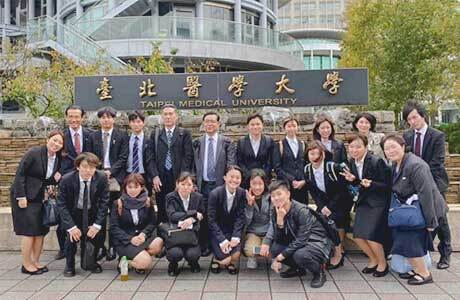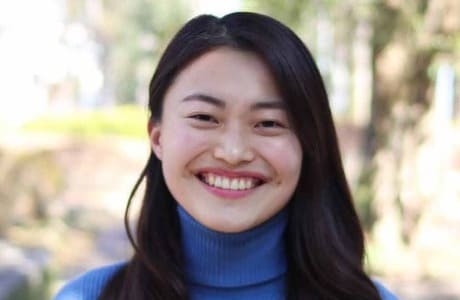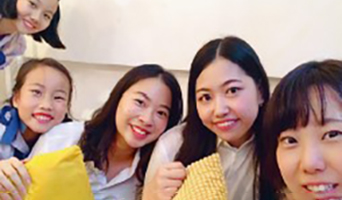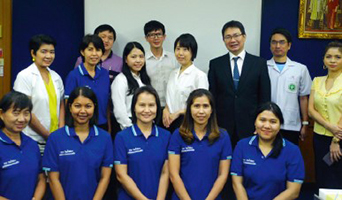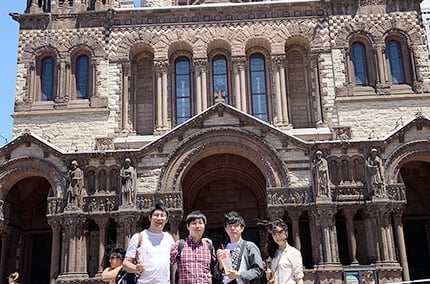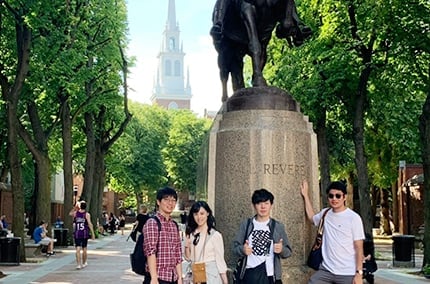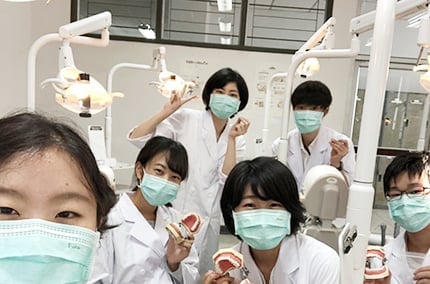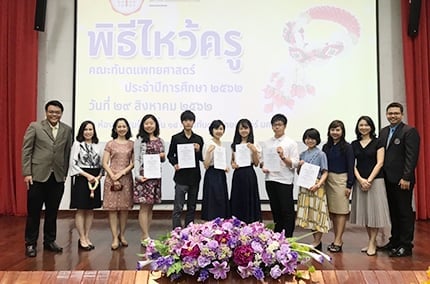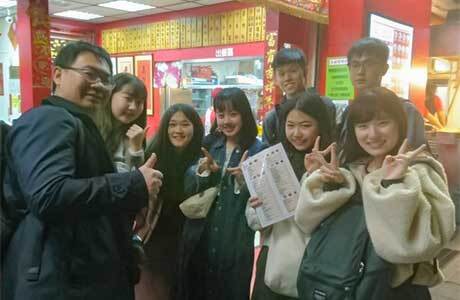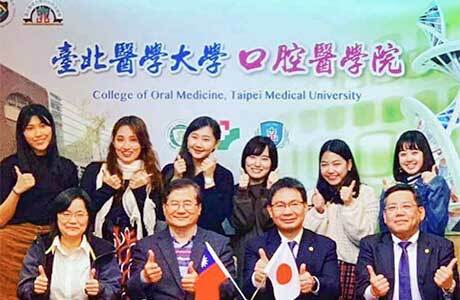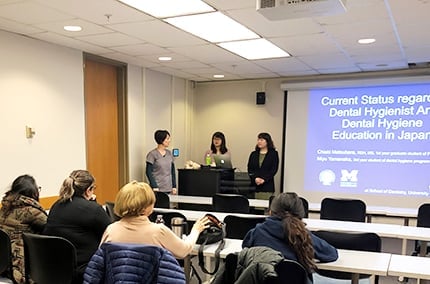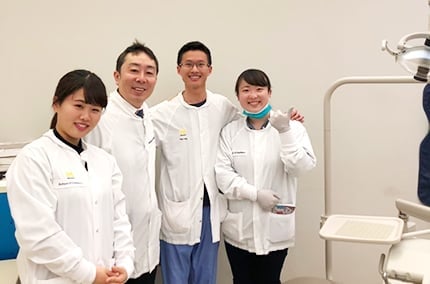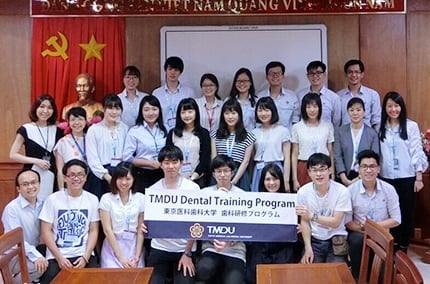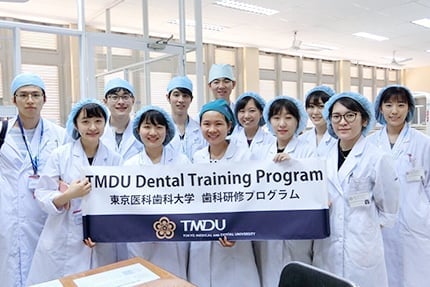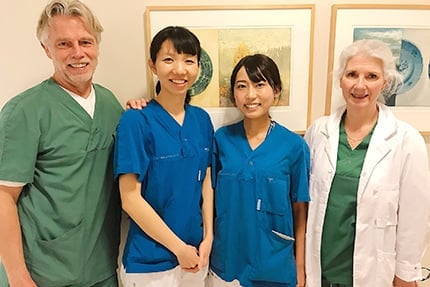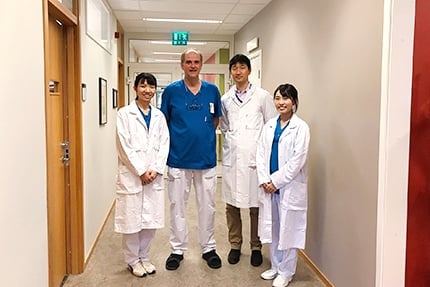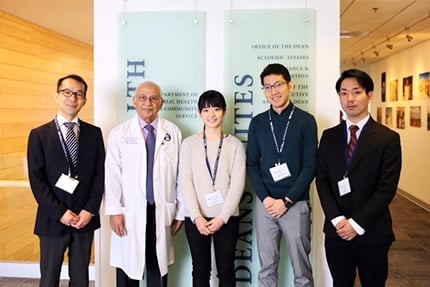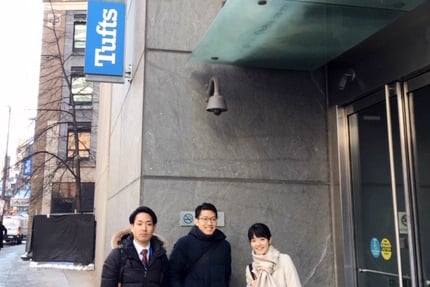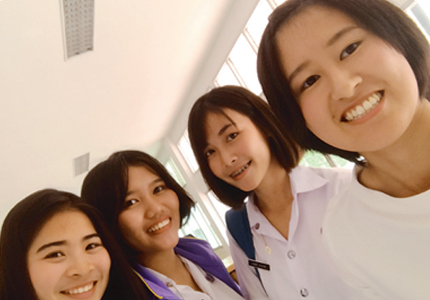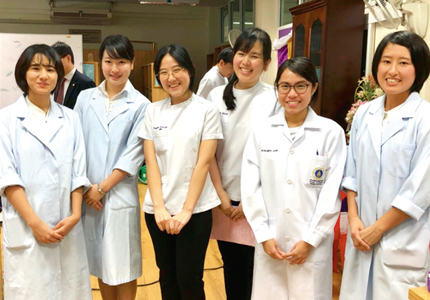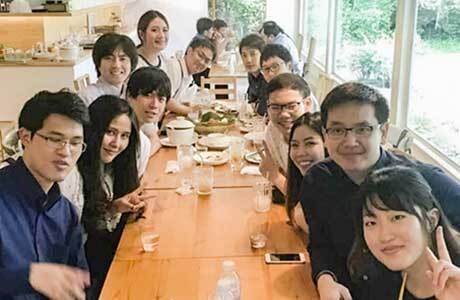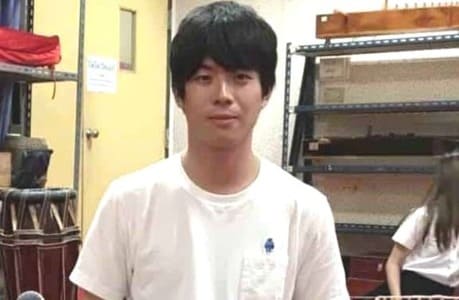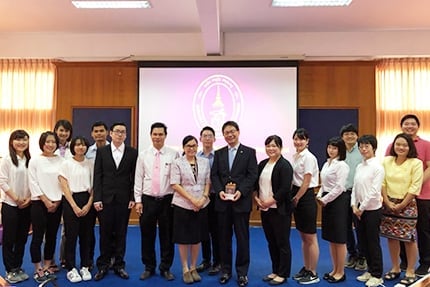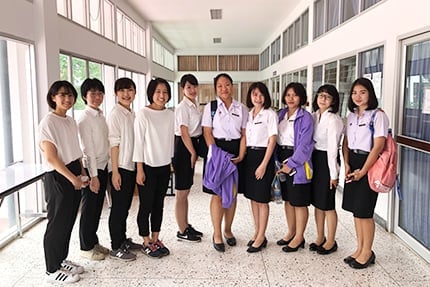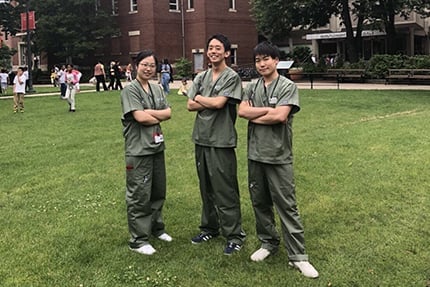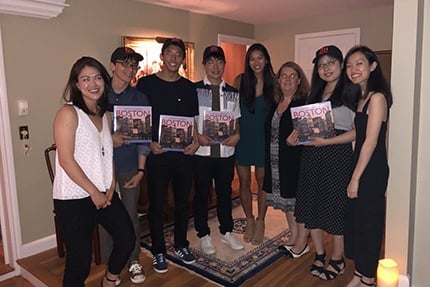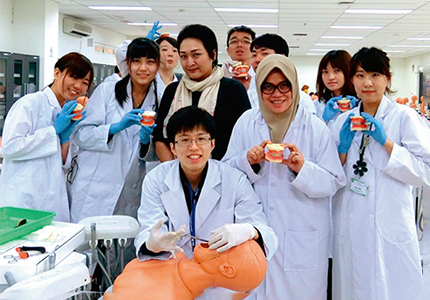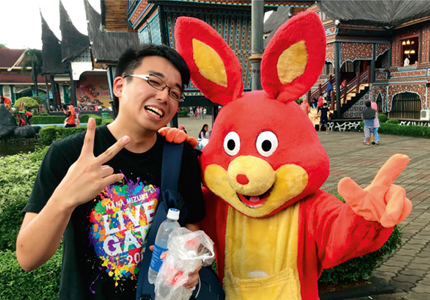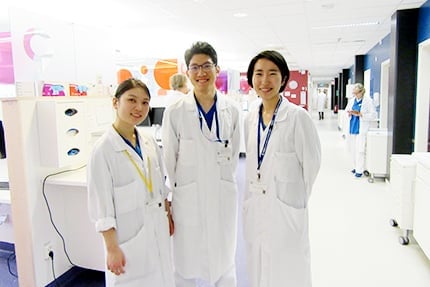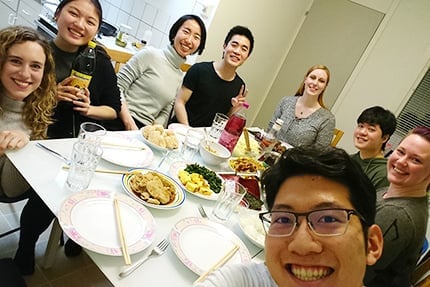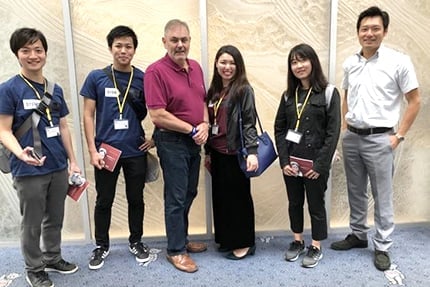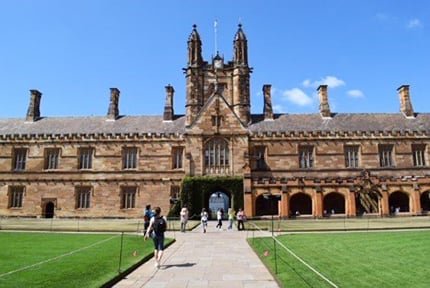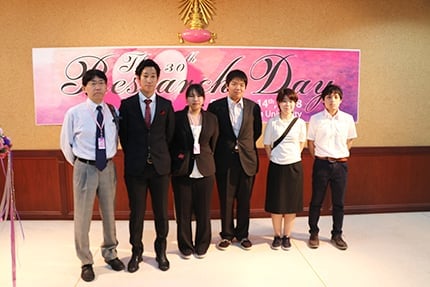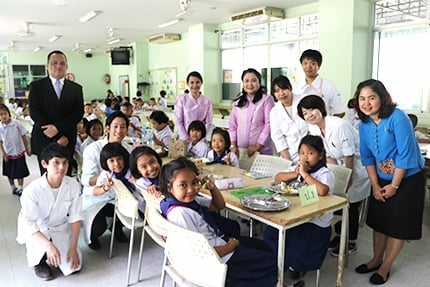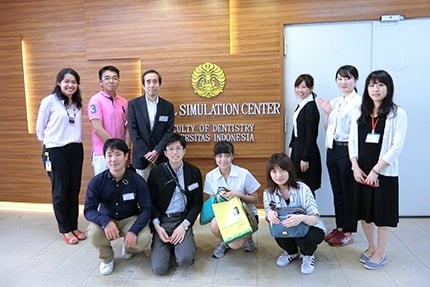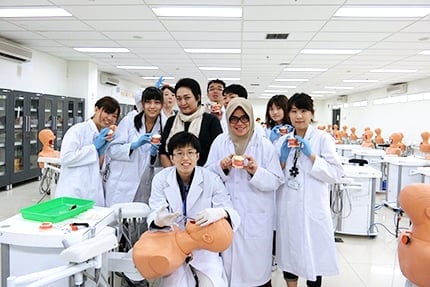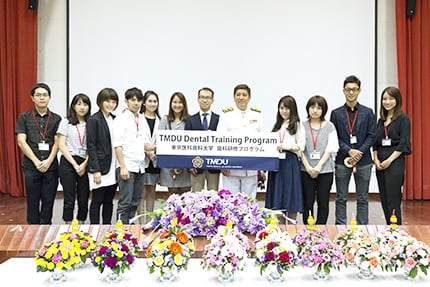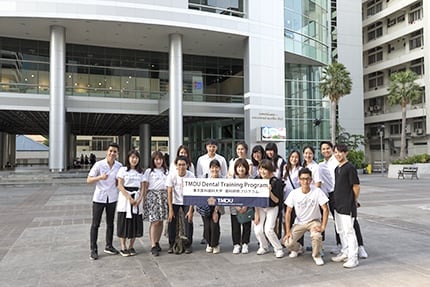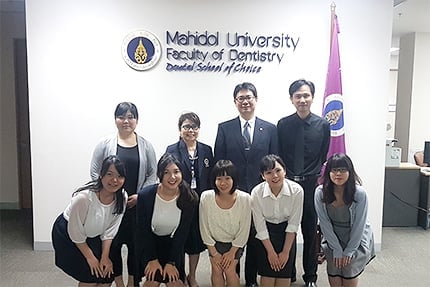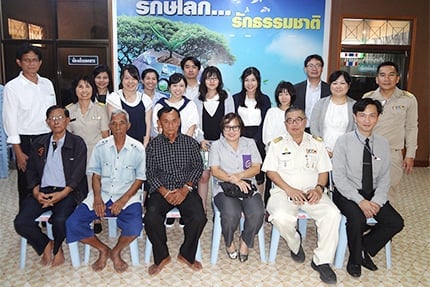International collaborations with affiliated overseas universities provide opportunities for students to participate in international programs and broaden their horizons. From academic year 2012, an international dental program started and since then, we have established strong bonds and networks.
AY 2019 autumn
<Taipei Medical University (Saki Nara, 3rd-year student, School of Oral Health Care Sciences)>
I participated in an exchange program to Taiwan for 5 days from
November 19th to 23rd, 2019. All 3rd year students in the Track
of Oral Health Engineering attended this overseas program. In
this program, I had a chance to visit Taipei Medical University
and some dental laboratories. For the first time in a long time I left
Japan and visited Taiwan for the first time, so everything was new
and exciting. The airport, city, people, and food. I absorbed many
things in a short time, and I enjoyed this overseas program.
On November 20th, I visited Taipei Medical University and they
showed us around the campus and hospital. Taipei Medical
University Hospital is an exceptionally large hospital. There is a
department called Family Dentistry in Taiwan. I thought it was one
of the things that was different from Japan. Our guide explained
that if you did not know the cause of the pain and did not know
which department to go to, you should go to Family Dentistry. I
thought it was like General Dentistry in Japan.
During my stay in Taiwan, I visited 4 dental laboratories: Arch
Dental Laboratory, Evolution Dental Laboratory, Jien-Shin Dental
Laboratory, and Smilden Dental Laboratory. They welcomed us
and showed us how they work in the dental laboratory. They are
proactively adopting digital systems for making dental prostheses.
What I noticed during the tour of the four dental laboratories in
Taiwan was the high level of English proficiency of the dental
technicians. I am convinced that this exchange program in another
country is a wonderful experience for students who are eager to
work globally in the future.
November 21st was the day for us to show our practice results for
the presentation and carving. We started presentation preparation
6 months before the program. We were divided into groups and
practiced English with native speakers. I gave a presentation in
English with more confidence than when I was practicing. In the
competition for carving skills, we competed with students from
Taipei Medical University. I had a very meaningful time. There were
still some points that required improvement, but I was incredibly
happy and satisfied with the result. I could say I’m proud of myself
for improving my carving skill further compared to what it was before
by practicing my carving repeatedly for the contest.
During my spare time before the awards ceremony, I went
to Taipei 101 with students from Taipei Medical University. I
really enjoyed talking with
Taiwanese students.
During this overseas
exchange program, I was
able to spend my 5 days
productively because I
explored not only dental
technology in Taiwan, but
also the Taiwanese culture.
I would like to express my
gratitude to all the people
who supported me.
出典:2020年 TMDU Annual News
AY 2019 Summer
<Mahidol University (Yuri Nakahama, 3rd-year student, School of Oral Health Care Sciences)>
IN SEPTEMBER, I visited Mahidol University in Thailand for nine days. I really enjoyed my stay in Thailand and gained a lot of valuable experiences. In my overseas training, I experienced and learned three major things. The first is about Thai dental education. At Mahidol University, dentistry students participated in actual treatment in hospitals as practical training. For example, in the practice of elementary school screening, children were given treatments that are generally performed in dental clinics in Japan, such as removal of tartar, instruction on how to use floss, and application of fluorine. We were also allowed to participate in this training assistance. The children were very friendly and cute. I was able to interact a little with them by teaching them simple Japanese, like “Arigato”.Second, I learned about Thai dental treatment. After visiting various facilities,I was surprised to learn that dental treatment in Thailand was at a level not much different from that in Japan, or even better. The most impressive of these facilities was a clinic that provided a large volume of dental aesthetic treatment to foreigners. In this clinic, cleaning, sterilization, and packing of instruments were performed in a single set of treatments. The clean area was managed very strictly. This can only be done because the hospital is very large, which is difficult in a small dental clinexperiment ic in Japan. I imagined that foreigners would be pleased to receive treatment in such a well-managed clinic. There were plenty of opportunities for me to speak English. Although I’m not particularly good at speaking English, I enjoyed communicating and interacting with Thai students. Finally, I learned a lot about the cultural aspects of Thailand. I experienced various activities, sightseeing and shopping. My favorite in particular was Thai food. I really like to try unfamiliar foods, especially exotic dishes sold by street vendors, various delicious sweets, and fruits that are not accessible in Japan. Overall, through this overseas shortterm training program, I was able to have many invaluable experiences. I gained a lot of knowledge, so I hope that I can use that new knowledge in my future career as a dental hygienist. I would like to thank all those involved in this overseas training, teachers who sent me overseas, the professors and family members who took care of me in Thailand, and students from the School of Dentistry at Mahidol University who kindly made contact with us.
出典:2020年 TMDU Annual News
<Boston University (School of Dentistry)>
<Srinakharinwirot University (School of Dentistry)>
AY 2018 Spring
<Taipei Medical University (Suzune Noda, 4th-year student, School of Oral Health Care Sciences)>
I visited Taipei Medical University for five days from March 4th
to 8th, 2019. Taipei Medical University (TMU), established in
1960, has ten specialized departments in medical care and five
associated hospitals. It receives 6,000 students every year. TMU
is also a research institute and has achieved many breakthroughs
and innovations. The university’s progress and growth in various
fields such as education, research, and services, have attracted
worldwide attention.
I interacted with students on the Oral Hygienist program of the
College of Oral Medicine. In Taiwan, no qualification as a dental
hygienist has been established, but at Taipei Medical University,
oral hygiene is taught as a long-term investment for the future.
Through my participation in several classes, I realized that the
systems and challenges related to dentistry differ between Japan
and Taiwan due to differences in the insurance systems and the
populations’ age distributions. In addition, through the hospital
visit, I learned that the water supply and electricity maintenance
was different from that of Japan, and the structures of the
systems were different.
During the training, students introduced us to local food and
guided us to sightseeing spots. I experienced the atmosphere
and smells of the local market and the tastes of different foods.
It was a fresh and interesting experience. In addition to learning
about dentistry, I greatly benefited from experiencing cultural
differences through the five-day exchange with students at Taipei
Medical University.
Through this training, I learned that dental hygienists play
an important role in solving dentistry and medical problems in
Taiwan, which is why Taipei Medical University provides advanced
education in this field. Many of the teachers have learned from
the situation in Japan, where dental hygienists have already been
established, and are seeking to apply this experience in Taiwan.
Many of the students were keen to learn about the experiences
of dental hygienists in Japan,
deepen their understanding
of the impor tance of oral
hygiene and become oral
hygiene specialists. I have
been fortunate to be in an
environment where I could
learn and work in oral hygiene,
and I aim to enhance my
knowledge and experience as
an oral health specialist.
出典:2020年 TMDU Annual News
<University of Michigan (School of Oral Health Care Sciences)>
<University of Medicine and Pharmacy, Ho Chi Minh City (School of Dentistry)>
<University of Gothenburg (School of Dentistry)>
<Tufts University School of Dental Medicine(School of Dentistry)>
AY 2018 Summer
<Mahidol University(School of Oral Health Care Sciences)>
I VISITED THAILAND for dental training last summer. I enjoyed it very much and I would like to return there again. I went to many facilities during this training, including the Golden Jubilee Dental Hospital, a community health center, a school for dental nurses, the faculty of dentistry at Mahidol University and a private clinic. I would like to introduce two things that impressed me during this training. First, dental nurses (DNs) in Thailand were similar to dental hygienists (DH) in Japan. In Thailand, most dentists work in urban areas, and DNs work in suburban areas, as there are not as many dentists there. I heard a DN’s story at the community health center, and I thought that she was doing wonderful activities for the community’s health. These included some of the same things that DH do, including preventive dental treatment and health education for children, elderly people and pregnant women. She also actively visited other locations such as schools and homes. Additionally, she made great connections with professional staff and volunteers, working hard with them to promote community health. As a DNs, she can do what DH can’t. Also, DNs have the skills and ideas for promoting community health through their connections. I think it is important to support the health of all the people in a given community. Second, regarding dental care activities in Thailand, there are systems, designs and practices that Japan does not have, like the idea of high level standard precautions for patients. I would like to adapt this to Japan to improve patients’ health and also protect Japanese dental care workers. Comparing Thailand and Japan, the dental treatment is almost the same. The differences are in the culture, available resources and environment. I think that’s why the systems and rules are different. If we don’t know about foreign culture, we may think that Japanese ideas are correct. By understanding the background of each country, we can discover a lot of good points and problems in both places. I felt that both Thailand and Japan are working hard to provide the best dental care to meet patients’ needs according to their cultures, resources and environments. Before this training, I was enthusiastic to learn about Thai dental treatment, culture and values. After finishing this training, I realized it was also an important opportunity for me to think about my own values. It was a valuable experience to study in a country far from Japan. I was glad to make good friends, too. I was influenced by them, especially their attitudes towards studying, their English skills and positivity. They helped me notice that I have to continue learning and acquire knowledge from my classes. I will stay in touch with them forever. These experiences made me strong and I would like to utilize them in my future and practical training. Thank you for giving me this valuable opportunity.
TMDU Annual News vol.11
<Srinakharinwirot University (Kentaro Harada, 4th-year student, School of Dentistry)>
In 2018, when I was in my second year, I went to the Faculty of
Dentistry, Srinakharinwirot University (SWU), Bangkok, Thailand. It
was only a two-week, short-term study program, but I gained an
overview of the facilities at the Faculty of Dentistry, the dentists,
the dental education curriculum, and so forth. In addition to the
direct insights I obtained from this program, I learned about Thai
culture, the atmosphere, and the Thai lifestyle. The teachers and
students at the university were keen to discuss issues during
lectures and when having lunch together. Those times deepened
my knowledge of the pros and cons of the Thai dental educational
programs, healthcare system, and insurance. I also broadened
my perspectives on the geographical and epidemiological
situation not only related to oral health but also in other healthcare
fields, which are also affected by the socioeconomic conditions
and the religious and political situations.
This was the first time for me to visit another country to study
as a dental student, so everything was fresh and inspiring. Before
studying abroad, I had never thought deeply about our dental
education, oral health status, and oral health problems, but
visiting Thailand led me to gain greater insight into dentistry in
Japan by comparison.
Lunch time with Faculty
Playing Thai traditional musical instrument
The many friends and connections made during this study
program were indescribably precious, expanded my future vison
and mission, and promoted my international exchange with
students and teachers in other countries.
One of the events this experience motivated me to participate
in was the “Discussion Café with SWU and Tokyo Medical
and Dental University (TMDU)” in 2020. Since COVID-19, it
has become harder for those hoping to study abroad to visit
other countries and to engage in international exchange. The
experience in 2018 prompted me to continue on-line international
exchange as one of the Discussion Café’s task force members.
We prepared for the Discussion Café sufficiently to enable
students to take part in international exchange, including new first
year students. The good news was that as many as 45 SWU and
TMDU students joined the on-line Discussion Café. We mainly
discussed two topics related to the changing situations under
the pandemic. The topics were: changes in dental medicine/
practice during and after COVID-19 and our school life after 2020.
The discussions revealed that even under each country’s difficult
pandemic situation, many students and universities were seeking
solutions to enable students to study as usual and continue their
enthusiasm for studying dentistry and international exchange.
出典:2020年 TMDU Annual News
<Mahidol University(School of Oral Health Care Sciences)>
<Boston University (School of Dentistry)>
AY 2017 Spring
<University of Indonesia (School of Dentistry)>
WE VISITED INDONESIA for eight days from March 4, 2018, for studentexchange activities between the
University of Indonesia (UI) and TMDU. I applied for this program as I had never been to Southeast Asia
and wanted to see a dental school in a
foreign country to expand my knowledge. We learned lots of things about dentistry and experienced
Indonesia’s culture during this overseas study.
At UI, we participated in a Prosthodontics and Oral Surgery Skills Lab, special lectures on microbiology
and dental materials and problem-based learning (PBL) for prosthodontics. UI students take lectures on
clinical dentistry from their first
year. Unlike Japanese universities, they do not seem to learn basic medicine. Therefore, although our
grades were different, they had already learned what we had only learned recently or have not yet learned
from lectures and practical
training at TMDU, and so I was a bit confused.
However, I was able to make use of those lectures as preparation for clinical subjects in TMDU.
Especially during PBL, I thought that the extent of their research and study was extraordinary. Each
student had a lot of information and participated in discussions. I realized that the time they spend
studying is overwhelmingly different
from Japanese university students.
We treated clinical content as the subject of PBL, and I realized that basic medicine was still very
important when studying clinical material. In fact, knowledge of immunology, pathology and histology were
very important.
Also, some people say that English education in Southeast Asia is not so advanced, but it is superior to
Japan. It was difficult to discuss the same topics in English, so I realized we have to be exposed to
English on a daily basis.
It was a great opportunity, and I was able to compare the strengths and weaknesses of education at our
university with the University of Indonesia. After graduating and acquiring our licenses, we can compare
ourselves again. That will be a
wonderful stimulus for studying hard, so I would like to try my best before comparing again.
We also gave presentations introducing life at TMDU and Japanese culture.
UI students gave presentations about UI and the culture of Indonesia in fluent English.
In addition, UI students guided us to a mosque, MONAS (National Monument) and Pari Island, where we
enjoyed cycling and snorkeling. We returned with a lot of precious memories.
This study program in Indonesia was a very good opportunity for me and I realized that I must study hard
about medicine moving forward.
TMDU Annual News vol.11




